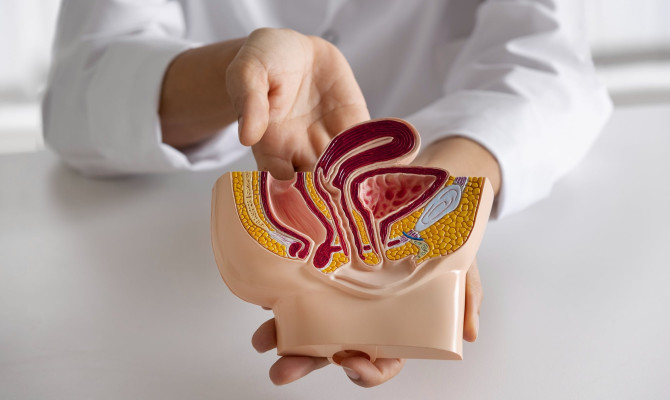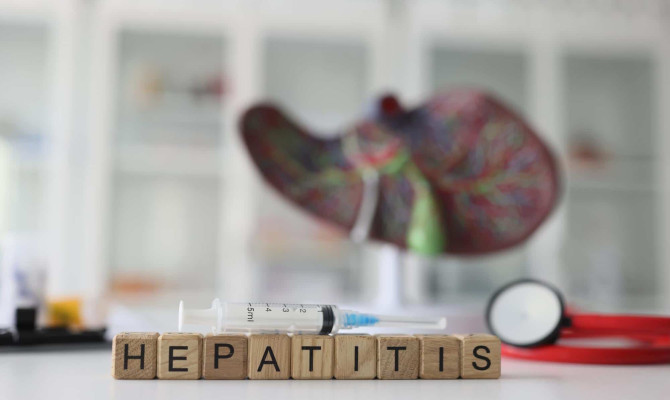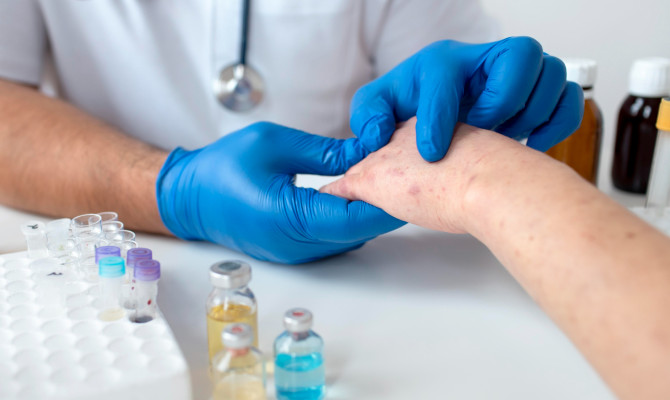Gestational Diabetes : How to maintain a health pregnancy?

- Gestational diabetes
- 17 Aug 2023
Overview
What is Gestational diabetes ?
Diabetes observed during pregnancy is called gestational diabetes. When you have diabetes, your blood glucose, which is also termed blood sugar, is particularly high. An unhealthy level of glucose in your blood is harmful to both you and your unborn child.4Overview| Researched based study from Medlineplus.gov
Diabetes is distinguished by abnormally high levels of blood glucose. In the United States, approximately seven pregnant women out of every 100 are diagnosed with gestational diabetes. After giving birth, the condition will typically resolve itself on its own. However, this does make you more likely to acquire type 2 diabetes at some point in the future. Additionally, there is a possibility that your child will become obese and develop type 2 diabetes.
During the second trimester of their pregnancies, the majority of women go in for a test to determine whether or not they have diabetes. Women at an elevated risk may have a test earlier.

Causes
What are the factors that cause Gestational diabetes?
Common factors that results in to Gestational diabetes are:
- Low level of Insulin
- Resistance to insulin action
- Being over weight
- Genetic causes
Low insulin levels
- If your body is unable to produce the additional insulin that is required during pregnancy, you will develop gestational diabetes. Insulin is a hormone that is produced in your pancreas that assists your body in utilizing glucose as a source of energy and assists in the regulation of your blood glucose levels.1Causes| Researched based study from Cdc.gov
Insulin resistance
- During pregnancy, your body will produce unique hormones and go through a number of additional changes, including an increase in weight. Insulin resistance is a condition that occurs when cells in your body are unable to make effective utilization of insulin as a result of the alterations described above.
- In the later phases of pregnancy, insulin resistance affects every pregnant woman to some degree. Although the majority of pregnant women are able to secrete adequate insulin to overcome insulin resistance, some pregnant women are unable to do so. Diabetes mellitus in pregnancy will manifest in these women.
Overweight
- There is a correlation between being overweight or obese and developing gestational diabetes. When pregnant, a woman who is insulin resistant may already have the condition of insulin resistance if she is overweight or obese. It’s possible that putting on too much weight during pregnancy is another risk.2Causes| Researched based study from Niddk.nih.gov
Genetic issues
- It is more likely that a woman will develop gestational diabetes if there is a history of diabetes in her family, which shows that genes have a role in the condition.1Causes| Researched based study from Cdc.gov ,2Causes| Researched based study from Niddk.nih.gov
Symptoms

Symptoms of Gestational diabetes
In most cases, pregnant women with diabetes won’t have any symptoms. The majority of cases are not identified until after a woman has undergone screening for gestational diabetes and had her blood sugar levels checked.
If a woman’s blood sugar level becomes excessively high (hyperglycemia), she may have a variety of symptoms, including the following:
- Heightened thirst
- The urge to urinate more frequently than normal
- A dry mouth
- Increased fatigue
- Symptoms such as hazy vision
- Genital itching, or thrush3Symptoms| Researched based study from Nhs.uk
On the other hand, several of these signs and symptoms are very typical during pregnancy and do not always point to the presence of gestational diabetes. If you are worried about any of the symptoms that you are having, talk to your midwife or your doctor about it.
Risk
Who has a higher likelihood of developing Gestational diabetes?
Developing gestational diabetes during pregnancy is possible for any woman, however, the following factors put you at a higher risk:
- You are older than forty.
- Your body mass index (BMI) is greater than 30; to determine whether or not you are at a healthy weight, utilize the BMI weight calculator.
- Have delivered a baby in the past that weighed more than 4.5 kilograms (10 pounds) at birth
- If previously experienced gestational diabetes during pregnancy.
- If either of your parents or one of your siblings has diabetes, or if you are of South Asian, Black, African-Caribbean, or Middle Eastern descent (even if your birthplace is in the UK)
- Have undergone weight loss surgery, maybe including a gastric bypass.
- Have gestational diabetes in the past have prediabetes, which means that your blood glucose levels are higher than usual but not high enough for a diagnosis of diabetes
- You have a hormonal problem known as polycystic ovarian syndrome, commonly known as PCOS. 3Risk| Researched based study from Nhs.uk
During your pregnancy, you ought to be offered to test for gestational diabetes if any of these situations sound familiar to you.
Effects
The potential impact that Gestational diabetes can have on a pregnancy
The vast majority of pregnant women who develop gestational diabetes have generally good pregnancies and deliver healthy children.
Nevertheless, gestational diabetes might result in complications such as the following:
Your baby is developing larger than usual
- Which may cause complications during the birth process and raises the risk that you will need to have an induction of labor or a cesarean section.
Polyhydramnios
- Excessive amniotic fluid present within the womb, which can lead to early labor or complications during delivery.
Preterm birth
- Delivering a baby prior to reaching the 37th week of pregnancy3Effects| Researched based study from Nhs.uk
Preeclampsia
- A condition that leads to high blood pressure at the time of pregnancy and can result in difficulties if it is not addressed. If preeclampsia is not treated, certain consequences can occur.
Low blood sugar or jaundice
- Your newborn infant getting low blood sugar or jaundice after he or she is delivered, all of which may require care in the hospital
Stillbirth
- Loss of your baby (stillbirth), although this is a very uncommon occurrence.
Type 2 diabetes
- If you’ve been diagnosed with gestational diabetes, you should be aware that it puts you at a higher risk of acquiring type 2 diabetes in the years to come.3Effects| Researched based study from Nhs.uk
Gestational diabetes in future pregnancies
- You are at a higher risk of getting diagnosed with gestational diabetes in your gestation periods in the future.3Effects| Researched based study from Nhs.uk
Diagnosis
How do medical examiners diagnose Gestational diabetes?
Blood testing is the primary method by which physicians identify gestational diabetes. You might have to do either the glucose challenge test or the oral glucose tolerance test, or even both of them. These tests will demonstrate how effectively your body utilizes glucose2Diagnosis| Researched based study from Niddk.nih.gov
In order to determine whether you are developing gestational diabetes, you will have to undergo one or multiple blood tests.
Glucose Challenge Test
- It’s possible that the glucose challenge test will be performed first.
- The glucose screening test is yet another term for this blood examination. In this test, a qualified medical practitioner will take a specimen of your blood one hour after you have consumed a sugary beverage that contains glucose.
- When you fast, you don’t consume any food or liquids other than water for a set period of time.
- If your blood glucose level is too elevated, which is defined as 140 or more, you may have to come back for an oral glucose tolerance examination while you are fasting.
- It is possible that you have type 2 diabetes if your blood glucose level is over 200.
Oral Glucose Tolerance Test (OGTT)
- After you have sustained without meals for a minimum of eight hours, the OGTT will measure the glucose levels in your blood.
- A member of the medical staff will initially take some of your blood. After that, you are going to drink a liquid that has glucose.
- In order for a doctor to diagnose gestational diabetes, they will need to draw blood from you once every hour for between two and three hours.
- If you have gestational diabetes, you have high blood glucose concentrations at any two or more of these blood test times: fasting, one hour, two hours, or three hours. Your healthcare team will explain the significance of the findings of your OGTT to you.
- Without initially doing the glucose challenge test, your doctor or other medical experts may suggest that you get an OGTT.
Treatment
Treatment for Gestational diabetes
Management of blood sugar levels
- If you have gestational diabetes, maintaining good management of your blood sugar levels will help lower the likelihood that you will experience complications with your pregnancy.
- You will be provided with a blood sugar testing kit so that you may keep track of the results of the treatment on your own.
Diet management and physical activity
- Altering one’s diet and, if at all possible, engaging in increased physical activity can help bring blood sugar levels down.
- Walking, swimming, and prenatal yoga are all examples of low-impact activities that might help lower blood sugar levels. However, make sure to consult with your midwife or primary care physician before beginning any new activities.3Treatment| Researched based study from Nhs.uk ,4Treatment| Researched based study from Medlineplus.gov
At the time of your delivery
- If you are pregnant and have gestational diabetes, you should try to have your baby before you reach 41 weeks.
- If labor has not begun spontaneously by this time, you may be given the option to have it induced or have a cesarean section performed.
Medicine for Gestational diabetes
If your blood glucose concentrations are still not consistent one to two weeks after making changes to your diet and exercising on a regular basis, or if your blood sugar level is very high when you are initially diagnosed with diabetes, a physician may prescribe medication for you.
Tablets
- Metformin can be taken in the form of a pill up to three times a day, most commonly before, during, or after meals.
- Glibenclamide is the name of a distinct kind of pill that may be prescribed on occasion.
Insulin
Insulin may be indicated in the following situations:
- You are not allowed to take metformin since it may have adverse consequences.
- If you have very high blood sugar, a very large baby, or too much fluid in your womb (also known as polyhydramnios), metformin may not be effective enough to bring your blood sugar levels down to a healthy level.
- Insulin is administered by the use of an insulin pen, which ensures your injections are done correctly and safely.
- It is possible that you will need to take your insulin before meals, before going to bed, or when you first wake up. This will depend on the type of insulin that your doctor has recommended for you.
Prevention
How to prevent Gestational diabetes?
Reduce your weight
- If you are overweight and are considering becoming pregnant, you can reduce your risk of developing gestational diabetes by decreasing your excess weight and increasing the amount of physical activity you do before you become pregnant.2Prevention| Researched based study from Niddk.nih.gov
- Do not make an effort to reduce your weight after discovering that you are pregnant. It is important for the well-being of your baby that you gain some weight. However, if you gain a significant amount of weight in a short amount of time, this may raise your risk of getting gestational diabetes.
- Talk to your obstetrician about the appropriate amount of weight gain and level of physical activity for you during your pregnancy.
Maintain normal glucose levels
Taking necessary actions that can help your body become more efficient at using insulin, which in turn will assist in maintaining normal blood glucose levels, Like2Prevention| Researched based study from Niddk.nih.gov
- Regular checking of blood sugar level
- Taking medicine as prescribed by the healthcare professional
- Take healthy diet
- Regular walk or any other exercise as suggested by doctor
Takeaway
Takeaway Tips
- High blood sugar (glucose) is the primary symptom of gestational diabetes, which manifests itself during pregnancy but typically resolves itself after delivery.
- Although it can occur at any time during pregnancy, it is significantly more likely to do so in the second or third trimester.
- It occurs when your body is unable to create enough insulin, which is a hormone that helps manage blood sugar levels, to fulfill the additional requirements that pregnancy places on it.
- Diabetes that develops during pregnancy might put both you and your baby at risk for complications both throughout pregnancy and after delivery. However, the dangers can be mitigated if the illness is diagnosed quickly and treated appropriately.
Any feedback on this article?
 This Articles content was accurate
This Articles content was accurate Very Informative Article
Very Informative Article I have a question or a comment
I have a question or a comment
 This article contains inaccurate content
This article contains inaccurate content This article was not helpful
This article was not helpful I have a question or a comment
I have a question or a comment
We appreciate your helpful feedback!
Checkout our social pages
References
-
Centers for Disease Control and Prevention
Gestational Diabetes | Causes
-
National Institute of Diabetes and Digestive and Kidney Diseases
Gestational Diabetes | Causes | Diagnosis | Prevention
-
National Health Service
Gestational diabetes | Risk | Symptoms | Effects | Treatment
-
Medline Plus
Diabetes and Pregnancy | Overview | Treatment





































